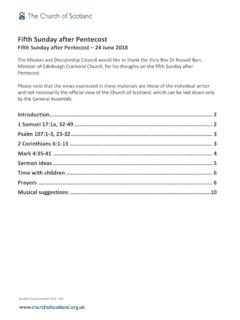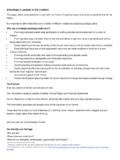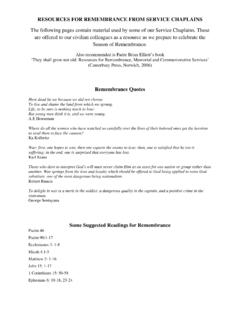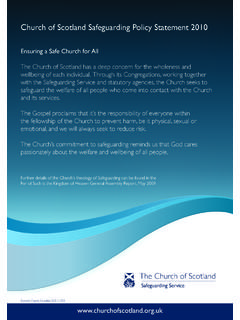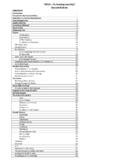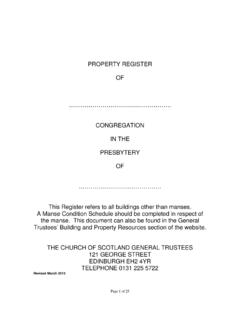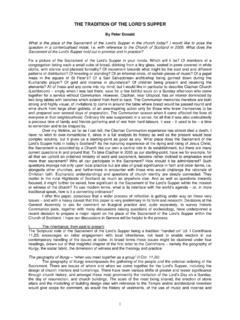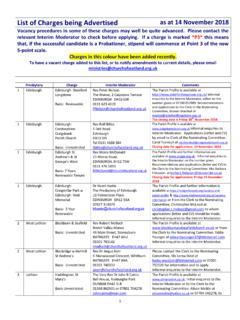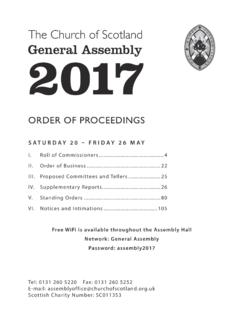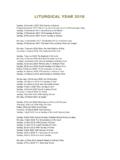Transcription of Ninth Sunday after Pentecost - …
1 Ninth Sunday after Pentecost Ninth Sunday after Pentecost 22 July 2018 The Mission and Discipleship Council would like to thank Rev Tom Gordon, former Chaplain to Marie Curie Hospice, Edinburgh, for his thoughts on the Ninth Sunday after Pentecost . Please note that the views expressed in these materials are those of the individual writer and not necessarily the official view of the Church of Scotland, which can be laid down only by the General Assembly. 2 Samuel 7:1-14a .. 2 Psalm 89 3 Ephesians 2:11-22 .. 6 Mark 6:30-34, 53-56 .. 7 Sermon ideas .. 8 Illustrative material, including Time with Children .. 10 Prayers .. 19 Musical suggestions .. 23 2 Samuel 7:1-14a Context King David consults with the prophet, Nathan, about building a temple. Why should he live in a House of Cedar while the Ark of the Covenant still rests in a tent?
2 At first, Nathan encourages the king. But Nathan has a revelation from God, stating that Solomon, and not David, should build the temple. God says: Since I led you out of Egypt, a tent has been my home. On the move, I don t need to be pinned down to one place. Where you and the people go, I will go with you. The Tent of the Ark is my symbol of that. I ve never asked any of the tribes to build me a House of Cedar. I am a shepherd for you, leading you from pasture to pasture. In my time you will settle. Till then, I will shepherd you on your travels. There will be more struggles for you to face, enemies to defeat. But I will keep you safe. Only when you have completed your pilgrimage will I settle you. Then you can build your House of the Lord. Decision-making for a king David extrapolates from the things of his life wealth, possessions, status enshrined in his House of Cedar and assumes that God would want the same grandeur, the trappings of wealth, the bigger the better.
3 But God says no! My ways are not the ways of the world. Keep it simple. A tent is enough for me. It s my constancy, my shepherding that matter, not signs of status, wealth or power. [Sermon Outline 1] If David had been in prayerful communion with God, he would know that God s promptings were out of line with his own thoughts. Nathan, on the other hand, gets the true message through listening to God s purposes. A pointer to Christ Blessings are promised to the family of David. These promises relate to Solomon, David's immediate successor, and the royal line of Judah. But they also relate to Christ, The Son of David . To Him God gave all power in heaven and earth. He was to build the Gospel temple, a house for God's name, the spiritual temple of true believers. David s house came to an end, but Christ will establish His everlasting Kingdom.
4 The nature of the Church David was ready to be settled. His symbol was to build a solid and immovable building where God could live, a sign of God s permanency. But God s symbol was the Tent of the Tabernacle, the Ark of the Covenant: prepared for anything; ready to face the next stage of the journey. Will there be a time when the trials of the journey are over and the enemies defeated? Yes, God says, but not yet. So for now, it s your job to concentrate on being ready. You are to be no more or less than a pilgrim people. [See Sermon Outline 1.] Psalm 89:20-37 The section of Psalm 89 which is most familiar to us in the Church of Scotland are verses 15, 16 & 18 (CH4 53). I offer here a continuation of this Psalm of Faith in similar vein, which can be used in conjunction with this Psalm (if used as a Lectionary Reading) or with the Old Testament lesson from 2 Samuel 7:1-14.
5 The tune, Tramps and Hawkers (CH4 - 5) works well, though other tunes which fit the DCM rhythm might be considered. As this is a new hymn was specially written for Weekly Worship , it can be used (and altered, if necessary) as appropriate to the circumstances, style and content of the worship. However, the copyright remains with the Mission and Discipleship Council of the Church of Scotland. So, if the hymn is printed or displayed, please include the following: Music [as chosen .. ]; Words by Tom Gordon; Church of Scotland Mission and Discipleship Council. Used with permission. Your servant, Lord, is sanctified, Now blessed with oil divine. Your faithful hands will hold him while More blessings You assign. While enemies may seek him harm, And wicked foes do wrong, Your faithful love will steadfast be; Your arm even yet be strong.
6 You are salvation s rock, he cries. For praise is Your true worth. And greater will You value him Than all the thrones of earth. And if the children of his flock, Forsake Your holy laws, You will not cease from loving them Though they may give You cause. You will not break Your covenant; Your truth ne er false will prove. You will not punish those who fall, Nor cast them from Your love. Just like the sun and moon, whose constant Presence guide our way, So may Your servants loud and long Their thankfulness display. While this hymn is based directly on the Lectionary Psalm, it now becomes or could be a hymn of dedication at an Ordination or Induction, or an admission of a New Communicant. It is written with the male pronoun, but, as with what follows, it could also be written appropriately for a female.
7 Your servant, Lord, is sanctified, Now blessed with oil divine. Your faithful hands will hold her while More blessings You assign. While enemies may seek her harm, And wicked foes do wrong, Your faithful love will steadfast be; Your arm even yet be strong. You are salvation s rock, she cries. For praise is Your true worth. And greater will Your value her Than all the thrones of earth. And if the children of her flock, Forsake Your holy laws, You will not cease from loving them Though they may give You cause. You will not break Your covenant; Your truth ne er false will prove. You will not punish those who fall, Nor cast them from Your love. Just like the sun and moon, whose constant Presence guide our way, So may Your servants loud and long Their thankfulness display. Finally, if it is necessary for example in the dedication of a group of New Communicants, the ordination of a number of new elders, or simply at a congregational service of rededication for the hymn to be gender-inclusive, it can be reworded as follows: Your servants, Lord, are sanctified, Now blessed with oil divine.
8 Your faithful hands will hold them while More blessings You assign. While enemies may seek them harm, And wicked foes do wrong, Your faithful love will steadfast be; Your arm even yet be strong. You are salvation s rock, we cry For praise is Your true worth. And greater will You value us Than monarchs of the earth. And if the children of Your flock, Forsake Your holy laws, You will not cease from loving us Though we may give You cause. You will not break Your covenant; Your truth ne er false will prove. You will not punish those who fall, Nor cast them from Your love. Just like the sun and moon, whose constant Presence guide our way, So may Your servants loud and long Their thankfulness display. Ephesians 2:11-22 Background Paul offers not general guidance, but wisdom in response to specific situations.
9 He wrote this letter in prison and it was clearly directed at the Gentiles (see 2:1). The core of the letter is the all-sufficiency of Jesus, and the whole letter can be summarised in two verses of the first chapter (1:9, 10). Our reading can be divided into three sections: 11, 12: Paul addresses the Gentiles; aliens from the society of Israel , not part of the holy people . The Gentiles are living in despair, he suggests, before Christ comes to bring them hope in their hopelessness. Three thoughts might be developed from this: Here is the core of the Gospel This is a pointer to the Incarnation We have an insight into where our world might find true hope [Sermon Outline 2.] 13-18: The Jews despised the Gentiles. But Paul indicates that those who were far away have been brought near (2:13). The door to faith is shut to no one.
10 The barrier, the dividing wall of hostility has been torn down (2:14). A metaphor from the Temple, this would be a powerful image for the Jews, where the walls which confined the Gentile to the outer court, beyond the Court of the Women, the Israelites, the Priests and the Holy Place, would be no more. Those who are far off can be brought close to God through the Mission and Service of the Church and Jesus Christ. No one regardless of ethnicity, gender, orientation, circumstances is excluded from that. The Gospel is inclusive. Barriers are torn down. There is no division any more between insiders and outsiders, the chosen and the rejected, men and women, different ministries, social circumstances. All are welcome in this place. [Sermon Outline 3.] Christ destroys barriers by the abolition of the flesh and regulations (2:15).
